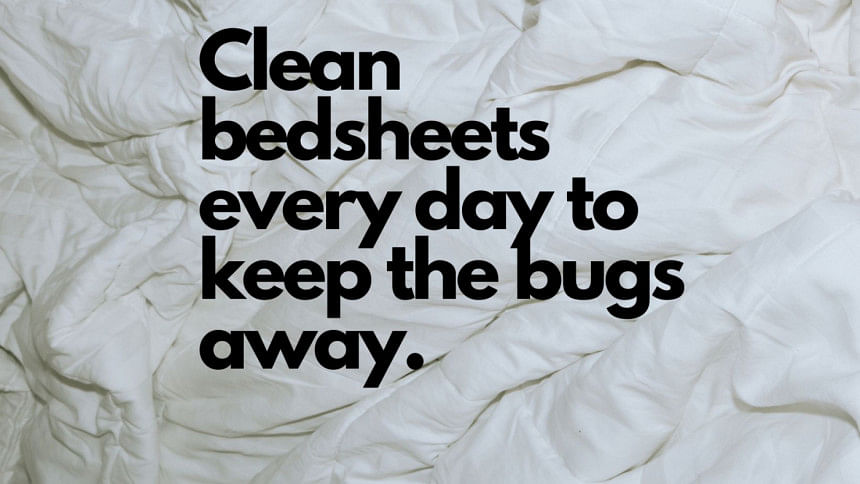Health hazards of not changing bedsheets regularly

Not washing your sheets on a regular basis exposes you to the fungi, bacteria, pollen, and animal dander that are typically found on sheets and other bedding. Other things found on sheets include body secretions, sweat, and skin cells. This will not necessarily make you sick. But, in theory, it might. Consider the health risks of not washing your sheets on a regular basis.
Undercover trouble
We spend a large part of our lives in bed, so clean sheets should be a priority. Consider drool, sweat, dandruff, and other 'things' between the covers. Wash them weekly or biweekly.
Mite-y gross
We lose an average of 500 million skin cells every day. As you roll around in bed, many shed. Between washes, dead cells accumulate on sheets. Dust mites eat shed cells. Their droppings can induce allergies, asthma, and eczema. Wash bedding weekly in hot water if you are allergic to dust mites.
Pet peeves
Do you sleep with your pet? Dust mites love to feast on Rover or Kitty's fur and dander on your bedding. If your dog has mange, also known as animal scabies, you cannot catch it from him, but your skin may become itchy and inflamed. In addition, your pets can potentially spread a fungal ailment known as ringworm of the scalp. Aim for once-a-week sheet changes.
Bacterial bed buddies
Dead skin cells, sweat, saliva, and other contaminants can transform your comfortable bed into a breeding ground for infections. For example, lab testing discovered that swabs from unwashed pillowcases had 17,000 times more bacteria colonies than samples retrieved from a toilet seat.
Bedroom breakouts
Is your acne getting worse, and you are not sure why? It is possible that your unclean pillowcase is to blame. Clogged pores can be caused by embedded dirt, dead skin, and bacteria. If you have frequent breakouts, you should replace your pillowcases every 2-3 days and the rest of your bedding once a week.
Sickly sheets
If you or your partner has been sick, throw your linens in the washing machine immediately to destroy any remaining germs. Most bacteria and viruses may persist for minutes to hours on soft surfaces. However, the duration varies depending on the microorganism. Flu viruses, for example, can exist on tissues for 15 minutes, whereas stomach bugs can remain on fabrics for up to 4 hours.
Pillow toss
Fungus can grow in places where you sleep at night, and certain of them can be deadly to those who have asthma. If you can wash your pillow — the fluffy stuff itself — do so at least twice a year. Follow the instructions on the care label. To avoid mildew, thoroughly rinse and dry it. If you use a pillow protector, wash it alongside your pillowcase.
Sheet swaps
Other factors can contribute to the icky factor between your sheets. Strip the bed weekly (or more frequently) if you:
-Sleep in your underwear
-Snack before going to bed
-Sleep with your children
- Sweat a lot in your sleep.
Let your sheets breathe
You may have heard that making your bed is the finest way to start the day. However, it is best not to rush. Because moisture accumulates in your linens after each night of sleep. Remove the blankets and allow your bed to dry when you wake up. As a result, bacteria and mites find it less appealing to nest.
Wash day tips
The tag recommends laundering bedding in the hottest water. Dry it off. Studies reveal dryer heat kills bacteria that survive the wash. If the colour is safe, put bleach on your sheets following use by a sick individual.
Dirty duvets and more
Some duvets and comforters are not machine-washable. Check laundry labels. Adhere to the following bedroom cleaning schedule:
-Comforters, blankets, duvets: 1-2 times/month. (Wash your top sheet if you do not use one.)
-Pillow: 4 times/year
-Bed skirt: 3-6-months. When you wash the bed skirt, vacuum the mattress to remove dust.
Bedbugs
They are not attracted to dirty or clean linens, but rather the people themselves. They like warm, populated locations like your bed. Bedbugs bite at night, and the bites may be itchy. Infested venues, like hotels, dorm rooms, neighbours' flats, schools, and workplaces, send bugs to your home on your coats. They are widespread. High heat for 30 minutes will kill bugs and eggs.
If you are guilty of putting off washing your bedding for too long, you might want to reconsider. Because if you do not, and you end up sleeping on unclean sheets night after night, you are going to have to deal with some truly awful side effects.

 For all latest news, follow The Daily Star's Google News channel.
For all latest news, follow The Daily Star's Google News channel. 










Comments